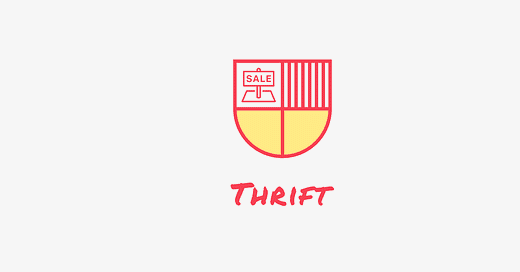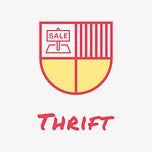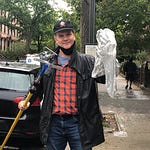Full episodes are available to everyone through Apple Podcasts on Thursdays. Paid subscribers get early access to new episodes right here on Substack. Interested in becoming a paid subscriber? You can read more about the perks here.
Episode show notes
Credits
Host: Maggie Blaha
Theme music: “Thanks for the Memory” written by Leo Robin and Ralph Rainger, performed by Bob Hope and Shirley Ross in the 1938 film of the same name
Background music: Night In Venice by Kevin MacLeod
Link: https://incompetech.filmmusic.io/song/5763-night-in-venice
License: http://creativecommons.org/licenses/by/4.0/
Maggie first heard about Obocho Peters and his thrift store on Good Morning America, and she knew she wanted to interview him about his mission on this season of the podcast. With the help of his mom, Sasha, the 11-year-old entrepreneur was able to set up an online and brick-and-mortar thrift store to help parents buy affordable clothes for their children.
The cost of thrifting has been on the rise in recent years, especially in cities like New York. This can have a negative impact on the people and families who rely on being able to buy secondhand clothes. Obocho was able to recognize this problem, and that’s why he opened a store where all the items are available for $10 or less. This episode is a great introduction to the topic of the gentrification of thrifting, which will be covered in later episodes this season.
Check out Obocho’s closet for yourself: www.obochoscloset.com
You can find Thrift: What Your Garage Sale Says About You in a few different places on the internet. Choose how you want to follow and engage with us:
Instagram: @thriftpodcast
Facebook: @thriftpodcast
Twitter: @thrift_pod
And please be sure to rate and subscribe to the podcast on Apple Podcasts, which will help other people find Thrift.
The online thrift shop is slowly coming along, which you can visit on Poshmark at the handle @thrift_podcast. For more updates, you can follow the store on Facebook @thriftpodcastshop and Instagram @thriftpodcastshop.
Episode transcript
*Note about the transcript: Em dashes (‘—’) have been used to indicate when a speaker doesn’t finish a thought or when the conversation between 2 speakers overlaps. [Punctuation decision inspired by Greta Gerwig.]
[OPENING]
Maggie: I feel like there are people who might think that it’s crazy for an 11-year-old to be running their own business. Did you ever feel like you couldn’t do it or lose faith in doing it, or have you always felt as confident as you are now?
Obocho: There were many times when I felt discouraged. There were 2 times when I felt the most discouraged. One when I first started my business—in the beginning I thought that I didn’t see people believing in me at first, and I thought that because I didn’t know a lot about business and didn’t know a lot about helping the community and how hard it was going to be. But once I started learning about business and how people helping you and supporting you works, then I learned what I need to do to get my business out there and how people will pay attention to my business and learn about my business.
The 2nd time I got really discouraged was when COVID hit, and I thought because a lot of major businesses have to close down their stores that there’s no reason for me to have my store anymore. On my birthday December 18th, 2019, my 11th birthday, that was the grand opening of this brick-and-mortar store. Then 3 months after that, in March, COVID hit, so I was thinking about closing the store completely, but then me and my mom had a long conversation about whether we should close or downsize the store. Then we decided on downsizing the store, so— Because now we have an online store, an online website, and the website is www.iamobocho.com—
Sasha: It’s Obocho’s Closet, sorry—
Obocho: www.obochoscloset.com
[INTRODUCTION]
Maggie: You’re listening to Thrift: What Your Garage Sale Says About You, a podcast that explores how we can all be more community-minded citizens through thrifting.
[THEME MUSIC, 30 SECONDS]
Maggie: I’m Maggie Blaha, and in that opening clip you heard from Obocho Peters, an 11-year-old entrepreneur in Brooklyn, and his mom and business partner Sasha, coming in at the end to make sure Obocho was giving the right URL for his online store, Obocho’s Closet.
Over the summer, I got to interview the amazing Obocho about his online and brick-and-mortar thrift store, which he opened to sell donated children’s apparel for under $10. I love this interview because 1.) Obocho’s work is so inspiring and 2.) it’s a great way to start a larger conversation about the gentrification of thrifting and how expensive it’s become.
[CLIP BEGINS]
Maggie: How and why did you decide to start your own business?
Obocho: I decided to start my own business because on April 27, 2018, I wanted 8 toys from the movie Avengers: Affinity War, but my mom couldn’t afford [them] and she didn’t have the money to get the toys because at that time she had just finished paying all the bills. So I decided to sell all my clothes and shoes that didn’t fit me in order to get the money for the toys that I wanted.
Maggie: Is The Avengers your favorite movie? Or favorite superhero movie?
Obocho: Yeah, it’s my favorite superhero movie.
Maggie: And they’re the inspiration to what lead you—
Obocho: Yeah, they’re the inspiration for the business. The toys [were] a part of the reason that I wanted to help my community and start the business, but another reason is because watching the movie I looked up to the superheroes because they’re always helping people in need, so I wanted to do that too and make someone’s day and make someone else happy.
Maggie: Why have you focused on children’s clothes?
Obocho: There are a lot of children that grow very fast because a lot of children, especially me, grow super fast, and a lot of parents don’t have enough money to get their children clothes that fast because at stores they’re selling clothes and shoes at a high price. So at Obocho’s Closet, we’re selling clothes and shoes at an affordable price, where no matter how fast your child grows, you can still get the amount of clothes that you need for your child.
Maggie: When did you realize that the high cost of clothes was a problem?
Obocho: I realized that the high cost of children’s clothes was a problem when my mom bought me my clothes at a young age before I had the idea to start my business, and I realized the very high cost, especially when my mom goes to thrift stores. My mom loves going to thrift stores and always used to say, “Why are the clothes so expensive?” So the clothes were super expensive even at thrift stores. It was super hard for families, even her to buy clothes for me because I was growing super fast at the time.
Maggie: Why do you think the prices at thrift stores and used clothing stores are so high?
Obocho: I think it’s super high because a lot of people that own the stores need to get money for their store, because in order to have the store they need to pay rent and stuff. But the people on the other side, the parents that are buying the clothes, they don’t know how hard it is to own a store. The people that own the store they need the money to keep the store they have, whether it’s a thrift store or any kind of store that sells children’s clothes. So with that money they can pay rent and all that stuff. And the money, especially if it’s name brand clothes, they need to put the right price for the right clothing piece they have in their store. So, if it’s like a big brand, they need to have a big price for the higher quality. The people who are buying clothes for their children, they don’t know how hard it is for the owner of the store… they even have to pay their employees. That’s why I think they put their clothes at a high price.
Maggie: Yeah, it’s a hard problem to solve on all angles
Obocho: Yes.
[CLIP ENDS]
Maggie: Of course this isn’t a problem that Obocho can solve on his own, but he decided that he could play a part in solving it in his own community.
[CLIP BEGINS]
Maggie: How did you come to think, ‘Oh, I think I can solve this problem?’ Or at least try to.
Obocho: I figured out how to solve that problem by asking my family and friends for donations if they had clothes that their children had grown out of. That’s how I started, along with my clothes that all added together to be the clothes that I used to give to families, so that they could buy them for their children.
[CLIP ENDS]
Maggie: With the help of his mom, Sasha, they rented a space through Brooklyn Commons on Flatbush Avenue at the end of 2019, and they’ve since downsized their brick-and-mortar location to a smaller space in the same building. The small storefront is where Obocho and I had our interview while sitting 6 feet apart and masked.
[CLIP BEGINS]
Maggie: Did you start with an online store? A brick-and-mortar store?
Obocho: I started with an online store because at first I needed an online store to sell my clothes. While I was getting together all the clothes that didn’t fit me and donations, my mom was doing all the editing and setting up the website for me, so we were doing 2 different things. And then we put it all together by taking pictures of the clothes and putting them on the website. When someone on Instagram DM’d us that they wanted to purchase some clothes, then we would package the clothes and ship them to a customer’s address or have them come and pick them up.
Maggie: So your mom’s your business partner then?
Obocho: Yes.
Maggie: Why was it important for you to open this brick-and-mortar store?
Obocho: All the donations that were coming in were being piled up in our house, and at one point we didn’t have enough room to fit everything. Once we got the brick-and-mortar store, we were going to put all the clothes on racks and set it up in the way we wanted to set it up, so we were just waiting for the right time to get the brick-and-mortar store. So we needed a place to put all the clothes in.
Maggie: Can you tell me a little bit about the space here? How did you choose this location?
Obocho: It’s not too far away from my house, and also at the time it wasn’t too far away from my school. So right after school— From 8:20-2:40 I would go to school, and then after my mom would pick me up and then we would come straight to the store and deal with the business. But now… That is the pandemic we’ve… This year I’m getting homeschooled, so I would wake up, then do my online learning, and then I would come straight to the store and do the business stuff.
Maggie: How do you go about pricing different items so that they’re affordable?
Obocho: Well, we look on different websites and see what their price is, and then we actually take our price down to 50% off or 75% off. It depends on what we want to put the price as because nothing in my store goes above $9.99.
[CLIP ENDS]
Maggie: To say that Obocho is ambitious would be an understatement. Not only does he have plans for the future of his business, he also has a big heart, and that means everything.
[CLIP BEGINS]
Obocho: My main goal is to make my business worldwide so families can spend less on their children’s clothes and shoes and spend more on their children’s college fund.
Maggie: So you want to keep the business running for a long time?
Obocho: Yes, for a long time, because I know it’s never gonna stop. Families are always going to need help with something, and families are always going to need to know about business, need to know how to manage their money better, and I always think it’s best to learn that stuff while you’re young, so when you get older you can be ahead of your time and know the materials and the things that you need to know in order to manage your money better.
Maggie: So I see that you’re wearing a Spider-Man [face] mask—
Obocho: Yes.
Maggie: And I know there’s this quote that ‘with great power comes great responsibility’—
Obocho: Yes.
Maggie: As an entrepreneur, do you think you have a great responsibility within your community?
Obocho: Yes...sometimes. Because the responsibility really is to— If you say you’re going to do something, you have to stick up to your word. Like there’s this date and time where I put out new masks every week, because me and my mom go to the fabric store, pick out the fabric we want to put on the mask, and then my mom sews the mask, and I also help my mom sew the mask. So we put out the masks every week on one specific day, and we put on Instagram that the masks have launched today, here’s the 4 new masks that we’ve put out today. Then people see the new masks, they order the new masks, and then they tell us which masks they want.
Maggie: Right, so producing face masks felt like something you needed to take on?
Obocho: Yeah, I started producing the masks on March 28, and I started selling the masks on April 1.
[CLIP ENDS]
[CONCLUSION]
Maggie: If you want to hear or read more from Thrift, there are a few places you can find the podcast on the internet.
On Facebook and Instagram, we’re @thriftpodcast. You can also follow the online thrift store on Instagram @thriftpodcaststore, or Facebook @thriftpodcastshop. We’ve also got a newsletter, which you can find at https://thriftpodcast.substack.com.
That concludes another episode of Thrift: What Your Garage Sale Says About You. Thanks for listening!
[OUTRO, 30 SECONDS]














Share this post